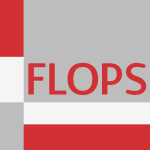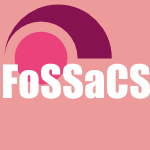25 papers:
 DAC-2015-WolfF #architecture #continuation #question #what
DAC-2015-WolfF #architecture #continuation #question #what- What don’t we know about CPS architectures? (MW, EF), p. 4.
 CBSE-2014-BuresHP #architecture #continuation #modelling #product line #runtime
CBSE-2014-BuresHP #architecture #continuation #modelling #product line #runtime- Strengthening architectures of smart CPS by modeling them as runtime product-lines (TB, PH, FP), pp. 91–96.
 PEPM-2014-KerneisSH #continuation #named #performance #static analysis
PEPM-2014-KerneisSH #continuation #named #performance #static analysis- QEMU/CPC: static analysis and CPS conversion for safe, portable, and efficient coroutines (GK, CS, SH), pp. 83–94.
 FLOPS-2012-TanakaK #call-by #continuation
FLOPS-2012-TanakaK #call-by #continuation- A Call-by-Name CPS Hierarchy (AT, YK), pp. 260–274.
 SEKE-2012-LiLCZJZ #adaptation #continuation #self #verification
SEKE-2012-LiLCZJZ #adaptation #continuation #self #verification- A HybridUML and QdL Based Verification Method for CPS Self-Adaptability (JL, BL, QC, MZ, SJ, XZ), pp. 239–242.
 SEKE-2012-ZhuLLCZJ #continuation #difference #logic #using #verification
SEKE-2012-ZhuLLCZJ #continuation #difference #logic #using #verification- HybridUML Based Verification of CPS Using Differential Dynamic Logic (MZ, BL, JL, QC, XZ, SJ), pp. 235–238.
 ICFP-2011-AhmedB #continuation #multi #semantics
ICFP-2011-AhmedB #continuation #multi #semantics- An equivalence-preserving CPS translation via multi-language semantics (AA, MB), pp. 431–444.
 PPDP-2011-BiernackaBL #continuation #type system
PPDP-2011-BiernackaBL #continuation #type system- Typing control operators in the CPS hierarchy (MB, DB, SL), pp. 149–160.
 DAC-2010-Lee #continuation
DAC-2010-Lee #continuation- CPS foundations (EAL), pp. 737–742.
 ICFP-2009-RompfMO #continuation #implementation #polymorphism
ICFP-2009-RompfMO #continuation #implementation #polymorphism- Implementing first-class polymorphic delimited continuations by a type-directed selective CPS-transform (TR, IM, MO), pp. 317–328.
 SAC-2009-LeeBPCLN #configuration management #named #precise
SAC-2009-LeeBPCLN #configuration management #named #precise- CPS-SIM: configurable and accurate clock precision solid state drive simulator (JL, EB, HP, JC, DL, SHN), pp. 318–325.
 CC-2009-BieniusaT #continuation #how #monad
CC-2009-BieniusaT #continuation #how #monad- How to CPS Transform a Monad (AB, PT), pp. 266–280.
 FLOPS-2008-Kobayashi08a #backtracking #continuation
FLOPS-2008-Kobayashi08a #backtracking #continuation- A New Translation for Semi-classical Theories — Backtracking without CPS (SK), pp. 210–223.
 CSL-2004-Kameyama #axiom #continuation
CSL-2004-Kameyama #axiom #continuation- Axioms for Delimited Continuations in the CPS Hierarchy (YK), pp. 442–457.
 TLCA-2003-Fujita #λ-calculus #μ-calculus
TLCA-2003-Fujita #λ-calculus #μ-calculus- A Sound and Complete CPS-Translation for λμ-Calculus (KeF), pp. 120–134.
 FoSSaCS-2002-DanvyN #continuation #first-order
FoSSaCS-2002-DanvyN #continuation #first-order- A First-Order One-Pass CPS Transformation (OD, LRN), pp. 98–113.
 PEPM-2002-BartheU #continuation #induction
PEPM-2002-BartheU #continuation #induction- CPS translating inductive and coinductive types (GB, TU), pp. 131–142.
 FLOPS-2002-Hasegawa #continuation #linear #monad #λ-calculus
FLOPS-2002-Hasegawa #continuation #linear #monad #λ-calculus- Linearly Used Effects: Monadic and CPS Transformations into the Linear λ Calculus (MH), pp. 167–182.
 ESOP-2001-ZdancewicM #continuation #data flow
ESOP-2001-ZdancewicM #continuation #data flow- Secure Information Flow and CPS (SZ, ACM), pp. 46–61.
 ICFP-2000-DamianD #continuation #program analysis
ICFP-2000-DamianD #continuation #program analysis- Syntactic accidents in program analysis: on the impact of the CPS transformation (DD, OD), pp. 209–220.
 ESOP-1999-DanvyY #continuation
ESOP-1999-DanvyY #continuation- An Operational Investigation of the CPS Hierarchy (OD, ZY), pp. 224–242.
 SAS-1995-NielsenS #call-by
SAS-1995-NielsenS #call-by- Call-By-Name CPS-Translation as a Binding-Time Improvement (KN, MHS), pp. 296–313.
 PEPM-1994-BondorfD #partial evaluation
PEPM-1994-BondorfD #partial evaluation- Improving CPS-Based Partial Evaluation: Writing Cogen by Hand (AB, DD), pp. 1–9.
 POPL-1993-HarperL #continuation #morphism #polymorphism
POPL-1993-HarperL #continuation #morphism #polymorphism- Explicit Polymorphism and CPS Conversion (RH, ML), pp. 206–219.
 LFP-1992-Bondorf
LFP-1992-Bondorf- Improving Binding Times Without Explicit CPS-Conversion (AB), pp. 1–10.
 DAC-2015-WolfF #architecture #continuation #question #what
DAC-2015-WolfF #architecture #continuation #question #what CBSE-2014-BuresHP #architecture #continuation #modelling #product line #runtime
CBSE-2014-BuresHP #architecture #continuation #modelling #product line #runtime PEPM-2014-KerneisSH #continuation #named #performance #static analysis
PEPM-2014-KerneisSH #continuation #named #performance #static analysis FLOPS-2012-TanakaK #call-by #continuation
FLOPS-2012-TanakaK #call-by #continuation SEKE-2012-LiLCZJZ #adaptation #continuation #self #verification
SEKE-2012-LiLCZJZ #adaptation #continuation #self #verification SEKE-2012-ZhuLLCZJ #continuation #difference #logic #using #verification
SEKE-2012-ZhuLLCZJ #continuation #difference #logic #using #verification ICFP-2011-AhmedB #continuation #multi #semantics
ICFP-2011-AhmedB #continuation #multi #semantics PPDP-2011-BiernackaBL #continuation #type system
PPDP-2011-BiernackaBL #continuation #type system DAC-2010-Lee #continuation
DAC-2010-Lee #continuation ICFP-2009-RompfMO #continuation #implementation #polymorphism
ICFP-2009-RompfMO #continuation #implementation #polymorphism SAC-2009-LeeBPCLN #configuration management #named #precise
SAC-2009-LeeBPCLN #configuration management #named #precise CC-2009-BieniusaT #continuation #how #monad
CC-2009-BieniusaT #continuation #how #monad FLOPS-2008-Kobayashi08a #backtracking #continuation
FLOPS-2008-Kobayashi08a #backtracking #continuation CSL-2004-Kameyama #axiom #continuation
CSL-2004-Kameyama #axiom #continuation TLCA-2003-Fujita #λ-calculus #μ-calculus
TLCA-2003-Fujita #λ-calculus #μ-calculus FoSSaCS-2002-DanvyN #continuation #first-order
FoSSaCS-2002-DanvyN #continuation #first-order PEPM-2002-BartheU #continuation #induction
PEPM-2002-BartheU #continuation #induction FLOPS-2002-Hasegawa #continuation #linear #monad #λ-calculus
FLOPS-2002-Hasegawa #continuation #linear #monad #λ-calculus ESOP-2001-ZdancewicM #continuation #data flow
ESOP-2001-ZdancewicM #continuation #data flow ICFP-2000-DamianD #continuation #program analysis
ICFP-2000-DamianD #continuation #program analysis ESOP-1999-DanvyY #continuation
ESOP-1999-DanvyY #continuation SAS-1995-NielsenS #call-by
SAS-1995-NielsenS #call-by PEPM-1994-BondorfD #partial evaluation
PEPM-1994-BondorfD #partial evaluation POPL-1993-HarperL #continuation #morphism #polymorphism
POPL-1993-HarperL #continuation #morphism #polymorphism LFP-1992-Bondorf
LFP-1992-Bondorf









